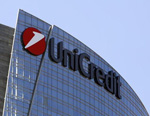 Bloomberg: The U.S. investigation of UniCredit SpA (UCG) on suspicions it violated economic sanctions with Iran involves far fewer transactions than those that surfaced in probes of other banks, Chief Executive Officer Federico Ghizzoni said. Italy’s biggest bank is one of several European financial institutions bracing for the outcome of investigations for alleged sanctions-busting for dealing with blacklisted countries.
Bloomberg: The U.S. investigation of UniCredit SpA (UCG) on suspicions it violated economic sanctions with Iran involves far fewer transactions than those that surfaced in probes of other banks, Chief Executive Officer Federico Ghizzoni said. Italy’s biggest bank is one of several European financial institutions bracing for the outcome of investigations for alleged sanctions-busting for dealing with blacklisted countries.
Bloomberg
By Sonia Sirletti and Flavia Rotondi
 The U.S. investigation of UniCredit SpA (UCG) on suspicions it violated economic sanctions with Iran involves far fewer transactions than those that surfaced in probes of other banks, Chief Executive Officer Federico Ghizzoni said.
The U.S. investigation of UniCredit SpA (UCG) on suspicions it violated economic sanctions with Iran involves far fewer transactions than those that surfaced in probes of other banks, Chief Executive Officer Federico Ghizzoni said.
Italy’s biggest bank is one of several European financial institutions bracing for the outcome of investigations for alleged sanctions-busting after France’s BNP Paribas SA (BNP) was fined a record $8.97 billion in June for dealing with blacklisted countries. French lenders Credit Agricole SA (ACA) and Societe Generale SA (GLE) and Germany’s Deutsche Bank AG (DBK) and Commerzbank AG are also under scrutiny from state and federal authorities including the U.S. Department of Justice.
The UniCredit case involves volumes “by far lower than what we have seen with many other banks,” Ghizzoni said in an interview with Bloomberg Television late yesterday, referring to questionable payments the bank is alleged to have processed and could be fined for. He didn’t elaborate on the number and said the bank isn’t considering setting aside funds to cover possible penalties.
“We feel absolutely fine because we don’t have anything to fear, at least so far,” Ghizzoni said in the interview in Milan after UniCredit posted second-quarter earnings.
Photographer: Simon Dawson/Bloomberg
UniCredit SpA Chief Executive Officer Federico Ghizzoni said in an interview, “We feel… Read More
BNP Paribas pleaded guilty in June to processing almost $9 billion in banned transactions from 2004 to 2012 involving Sudan, Iran and Cuba and was fined the largest amount ever against a bank in a sanctions case.
Outcome Unknown
Ghizzoni joins Credit Agricole Deputy CEO Michel Mathieu in playing down the potential scale of penalties. Mathieu said in a French radio interview yesterday that he sees no risk that Credit Agricole could face penalties similar to those imposed on BNP Paribas.
In its annual report published in March, UniCredit reiterated that its German unit was subpoenaed in March 2011 by the New York district attorney’s office over transactions with certain Iranian entities subject to U.S. sanctions. It said it was cooperating and couldn’t “determine the form, extent or timing of any resolution.”
Since the investigation began three years ago, “we’ve had a number of meetings, providing all documentation needed,” Ghizzoni said. He described the cooperation as “very open” and “transparent.”
“We don’t have signals positive or negative, the cooperation on the case is really excellent and we are very proactive in providing information,” the UniCredit executive said. “This is the only case we are dealing with.”
Russia Sanctions
The bank said yesterday that profit rose 12 percent in the second quarter with help from Russia where its business continued to grow despite U.S. and European Union sanctions against the country over its support for armed separatists in Ukraine.
Ghizzoni said the effect of sanctions on UniCredit’s business is marginal in the short term. “The real impact could be on the GDP of Russia and consequently and gradually on the revenues generation of the bank,” he said.
The U.S. and the EU have unleashed measures restricting relations with Russian companies, banks and its technology industry after travel bans and asset freezes aimed at President Vladimir Putin’s inner circle failed to end the conflict in Ukraine.
UniCredit is the largest lender in the former communist part of Europe, the second-biggest foreign bank in Russia and one of the largest in Ukraine, a business it is trying to sell. The Russian business is still growing, the 58-year-old CEO said, adding he “still hopes” a solution will be found in the interest of Europe and Russia.


